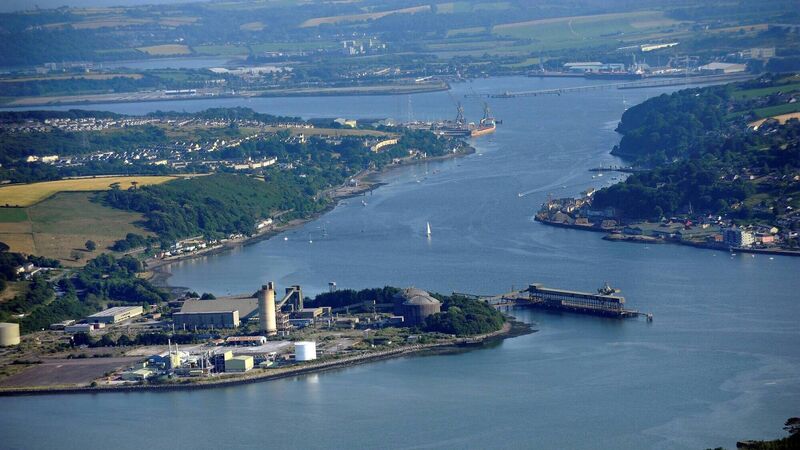Overturned IFI site plan a blow for Cork Docklands regeneration

Aerial Marino Point Former IFI Plant and lands Picture: Denis Scannell
A decision to refuse planning for the development of an agricultural fertiliser facility in Cork Harbour, which will have a knock-on effect of indefinitely delaying the building of 1,300 homes in the city, has been described as “very disappointing” and a major setback to the regeneration of the Docklands.
On Monday, An Bord Pleanála refused planning permission for a new port facility on the site of the former Irish Fertiliser Industries (IFI) plant at Marino Point in Cork Harbour.
Planning had initially been granted in 2020 by Cork County Council to Goulding Soil Nutrition to construct an agricultural fertiliser facility and develop the existing jetty at Marino Point to better facilitate cargo vessels.
However, An Bord Pleanála has overturned that decision following concerns from Passage West residents about the impact the facility would have regarding increased traffic and noise pollution.
In its decision, the appeals board said the R624 Cobh road and its capacity would not be sufficient to cater for any traffic-intensive use, port-related or otherwise.
Last year, O’Callaghan Properties was granted planning for 1,325 apartments at the current Goulding site at Centre Park Road and Monahan Road, the largest residential development plan seen to date in the city.
With those plans dependent on a positive decision on the former IFI site from An Bord Pleanála, the O’Callaghan development is now on indefinite hold as Goulding has said it will continue to operate from its Centre Park Road facility.
Fine Gael senator Jerry Buttimer, who is running for a Dáil Éireann seat in Cork South Central in Friday’s general election, said that while he was cognisant of “the legitimate concerns” made by some locals, the decision by An Bord Pleanála has “baffled” him.
“It’s very disappointing for the redevelopment of the city and it poses serious question marks about the development of the Docklands and the impact that it will have on the development of housing in the city,” Mr Buttimer said.
“It also poses questions around the development of the port, but for me the decision by An Bord Pleanála poses a huge question around making the redevelopment of the Docklands the centrepiece of the city.”
Mr Buttimer said the decision was “even more amazing” given the previous planning decision by Cork County Council.
“I just am baffled by the decision of An Bord Pleanála in the overall scheme of things, especially when you look at the National Development Plan, the City Development Plan, this decision is just really inexplicable.”
In a statement, O’Callaghan Properties said the decision, which it described as two years overdue, had major negative implications for the provision of housing in Cork and for the development of Docklands.
“Its immediate impact is to prevent the development of 1,325 apartments for which O’Callaghan Properties secured planning permission in 2023.
“It also prevents the development of a further 500 apartments envisaged for the remaining portion of the Goulding site,” the company said.
O’Callaghan said the “infrastructure deficit” referenced in the decision must be urgently resolved if the Docklands were to be developed.
Describing the decision as a setback to the regeneration of the Docklands, the chief executive of Cork Chamber, Conor Healy, said critical infrastructure, such as the R624, must be prioritised to facilitate the Port of Cork’s move to the lower harbour, opening up lands for the Docklands development.
“The regeneration of the Docklands is of national strategic importance and is a vital project for Cork city and county, particularly as the population of the city region is expected to grow by 50% in the years to 2040,” he said.
Under current plans, Mr Healy said, the upgrade of the R624 road was likely to take anywhere up to nine years; this needs to be accelerated in local and national development plans.
“It is vital that the road upgrade is prioritised, alongside the appropriate rail infrastructure and rail freight facilities,” he said.







 App?
App?


